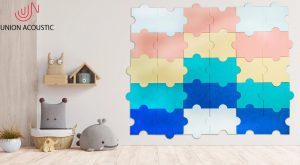Walls are an essential component of any building, and they serve several purposes, including providing privacy, insulation, and soundproofing. Soundproof walls are crucial in commercial and residential buildings, especially in noisy environments. A soundproof wall is a wall that has been constructed or modified to prevent sound from passing through it. The primary purpose of soundproofing is to reduce the amount of noise that passes through walls, ceilings, and floors.

There are several materials that can be used to make walls soundproof. The most common materials used for soundproofing walls are mass-loaded vinyl, acoustic foam panels, and soundproof curtains. Mass-loaded vinyl is a dense, flexible material that is used to add mass to walls and reduce the amount of sound that passes through them. Acoustic foam panels are designed to absorb sound waves and reduce the amount of noise that bounces off walls. Soundproof curtains are made of heavy, dense materials that block sound waves from passing through them.
Types of Soundproofing Materials
Mass-Loaded Vinyl
Mass-loaded vinyl (MLV) is a popular soundproofing material that is made of vinyl and other heavy materials. It is an effective sound barrier that can reduce noise transmission through walls, ceilings, and floors. MLV is easy to install, and it can be used in combination with other soundproofing materials to achieve better sound insulation. It is commonly used in recording studios, home theatres, and other places where noise reduction is required.
Acoustic Foam
Acoustic foam is another soundproofing material that is commonly used to reduce noise transmission. It is made of foam that is designed to absorb sound waves, reducing the amount of noise that passes through walls and other surfaces. Acoustic foam is lightweight and easy to install. It is commonly used in home theatres, recording studios, and other places where noise reduction is required.
Fibreglass Insulation
Fibreglass insulation is a popular soundproofing material that is commonly used in homes and other buildings. It is made of glass fibres that are woven together to create a dense, sound-absorbing material. Fibreglass insulation is effective at reducing noise transmission through walls, ceilings, and floors. It is also an effective thermal insulator, helping to keep buildings warm in the winter and cool in the summer.
Resilient Channels
Resilient channels are a type of soundproofing material that is commonly used in walls and ceilings. They are metal channels that are designed to reduce noise transmission by creating a gap between the wall or ceiling and the soundproofing material. This gap helps to prevent sound waves from passing through the wall or ceiling. Resilient channels are easy to install and can be used in combination with other soundproofing materials to achieve better sound insulation.
Soundproofing Standards and Regulations
When it comes to soundproofing walls, there are certain standards and regulations that must be followed. These standards are in place to ensure that the soundproofing materials used meet certain requirements and are effective in reducing noise transmission.
In Singapore, the National Environment Agency sets out the requirements for sound insulation in buildings. This agency specifies the minimum standards for sound insulation between different types of rooms and between dwellings.
Aside from the NEA, there are also other regulations and standards that may apply depending on the type of building and its use. For example, schools and hospitals may have additional requirements for sound insulation to ensure that patients and students are not disturbed by noise.
It is important to consult with a professional soundproofing contractor to ensure that the soundproofing materials used meet all relevant standards and regulations. This will ensure that the soundproofing is effective in reducing noise transmission and that the building meets all necessary requirements.
